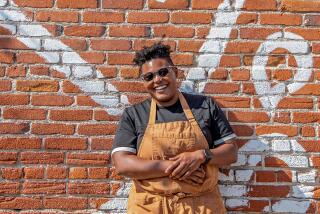The Bitter Taste of Inequality
- Share via
NEW YORK — A female executive who has risen through the ranks of corporate America may have an impressive title and a six-figure salary, but the trappings of success are irrelevant the minute she enters a restaurant or liquor store.
Indeed, even with a Harvard degree and a much more visible Armani suit and Coach briefcase, a woman may seem invisible to a waiter or salesman who has a male customer in sight.
“Almost every woman I’ve talked to has a story,” said Tim Zagat, co-publisher of Zagat restaurant surveys. Information compiled for the new 2000 edition of the Zagat Survey of America’s Top Restaurants showed that 83% of respondents felt that men are treated better than women when eating out.
The survey is based on questionnaires answered by about 100,000 respondents throughout 1998 and ’99 and compiled in Zagat guides for individual cities. The America’s Top Restaurants guide describes 1,130 leading restaurants in 38 cities and provides ratings for food, decor, service and cost.
In breaking out the results, Zagat said 90% of respondents in the San Francisco area felt that men were treated better; in New York it was 80%.
“This suggests that, when dining in mixed company, men are targeted as primary check payers by restaurant staff, who lavish better service their way,” Zagat said. When men and women dine together, he said, men are usually given the wine list and asked to choose and taste the wine, regardless of the expertise of the women at the table.
Women diners also say they are treated like second-class citizens when they dine alone or with other women, and they often get inferior tables and service, Zagat said.
JoEllen Zacks, a media relations manager for the American Bar Assn. in Chicago, agreed, saying restaurants often try to seat her in the back when she dines alone while on the road. “I ask to be moved. I’m not shy about it,” she said.
Zacks said women may also receive inferior service because of a perception that they do not tip as well as men. “It becomes a self-fulfilling prophecy. We don’t get treated well, so we tip accordingly,” she said.
Zagat said some French, Italian and Spanish restaurants and steakhouses also discriminate against women by refusing to let them work as servers. This is true most often in New York and other Northeastern metropolitan areas where some restaurants still “look to Europe,” he said.
Industry experts say the no-women wait-staff policy remains standard in many elegant restaurants, where tuxedo-clad waiters are considered part of the prestige of upscale dining.
“There is some blatant discrimination going on, and people seem oblivious to it,” Zagat said. “As you go further west, restaurants are more inclined to hire women.” The practice has generated some litigation. For example, New York Atty. Gen. Eliot Spitzer sued the Cipriani restaurant family in August for allegedly denying women jobs that can generate more than $95,000 annually. The family’s U.S. company is 100% owned by Cipriani SpA, an Italian corporation.
Juanita Scarlett, a Spitzer spokeswoman, said the attorney general plans to sue additional restaurants early next year.
Marlene Rossman, president of the Rossman, Graham Associates marketing firm in New York, said there are similar problems at liquor stores in the city, where there are few women salespeople and female customers are often treated poorly.
“By and large, even as a woman with a lot of buying power, I’m not treated in the same way as a man in a similar situation,” said Rossman, who is also president of the New York chapter of Women for WineSense, an educational group.
She conducted a study to prove her point, sending teams of shoppers and observers unannounced to 11 Manhattan liquor stores between August and November. The shoppers included a middle-aged white woman, an Asian American woman, a black woman and a white man. Each shopper was instructed to get advice on a wine to go with trout.
“The white male got the best service, the white woman indifference or condescending service, the Asian American was either ignored or given patronizing service, and worst of all was the service received by the black woman,” the findings said.
“I was either ignored or treated with disdain,” the black shopper said in the report. “My overall impression was that of very condescending service. The salesmen didn’t know or care if I had a clue about wine.”
She said most salesmen assumed she wanted an inexpensive wine, showing her bottles for less than $10 even though they did not ask her price range. On at least one occasion, she was followed around the store by a security guard.
Dr. Wanda Dobrich, a psychologist and partner of D & D Industrial Consultants of Montclair, N.J., which conducts gender bias training, said that while men in service positions sometimes are demeaning to women on purpose, often they simply do not understand that their behavior is insulting.
Women also may have difficulty speaking up to ask for a different table or complain about service, Dobrich said, explaining that women are often socially conditioned to be more polite and are concerned about appearing rude. “How much assertiveness is too much? Women need to simply state what they want,” Dobrich said.
More to Read
Eat your way across L.A.
Get our weekly Tasting Notes newsletter for reviews, news and more.
You may occasionally receive promotional content from the Los Angeles Times.










